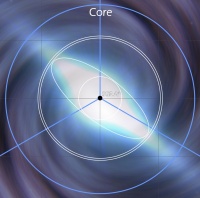Difference between revisions of "Galactic Core"
| Line 8: | Line 8: | ||
==Core Dimensions== | ==Core Dimensions== | ||
| + | (Parsec is abbreviated as PC)<br /> | ||
| + | <br /> | ||
| + | Radius == 4852 PC<br /> | ||
| + | Diameter == 9704 PC<br /> | ||
| + | Circumference == 30470.56 PC<br /><br /> | ||
| − | + | Area == 295,686,314.24 PC²<br /> | |
| − | + | Area == 295,686.31424 PC²<br /><br /> | |
| − | |||
| − | + | Volume = 478,465,894,048.27 PC³<br /> | |
| − | + | Volume = 4,784,658,940.4827 KPC³<br /> | |
| − | |||
| − | Volume = 478,465,894,048.27 | ||
| − | Volume = 4,784,658,940.4827 | ||
Revision as of 04:29, 15 May 2007
About
The galactic core, scientifically known as the Bulge, is located as the direct center and axis point of the galaxy. Politically, the core has been defined nearly perfectly spherically. While the bulge is not a perfect sphere, this makes the political galactic core to include parts and portions of the disks that would otherwise be normally included in a political trisector. Because of this, the core includes many species and factions that would otherwise be in a galactic trisector. The bulge itself is a bar, and is mostly made up of population type I stars and clouds.
The bulge also features one of the most densely known emission nebula's, with pockets classified as Dark Nebula. Because of the density of Population I stars, the ionization of the bar is very great making observation difficult prior to the development of string based scanners.
The density of stars also products pockets of non-nebulae space which were formed when matter would equalize in the pull of nearby stars. Because the bar nebula contains many types of nebula including Solar and Planetary, there have been some life bearing systems born within these pockets. During the course of the Expletuns Preserver movement, they had setup additional protection to ensure that these life-bearing system would be able to maintain their course, even unnaturally protected their harsh nebula environment.
Core Dimensions
(Parsec is abbreviated as PC)
Radius == 4852 PC
Diameter == 9704 PC
Circumference == 30470.56 PC
Area == 295,686,314.24 PC²
Area == 295,686.31424 PC²
Volume = 478,465,894,048.27 PC³
Volume = 4,784,658,940.4827 KPC³
